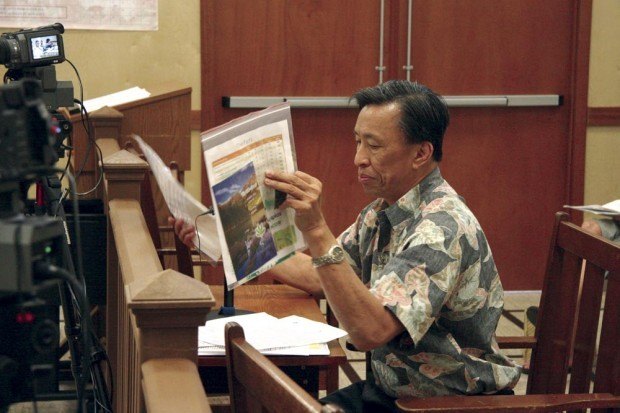LIHU‘E — Action on an amendment that would loosen a county law banning plastic bags from check-out lines was postponed another two weeks after an O‘ahu businessman proposed an environmentally conscious option. The Kaua‘i County Council’s Public Safety and Environmental
LIHU‘E — Action on an amendment that would loosen a county law banning plastic bags from check-out lines was postponed another two weeks after an O‘ahu businessman proposed an environmentally conscious option.
The Kaua‘i County Council’s Public Safety and Environmental Services Committee on Wednesday deferred its decision on legislation that would let ready-to-eat food establishments offer biodegradable bags. The amendment defines “biodegradable bags” as those made of a degradable plastic in which the degradation is caused by naturally occurring microorganisms.
“Let the new science come in,” said David Hong, president of O‘ahu-based Island Plastic Bags.
Hong said aliphatic bags, a new product in the market, are biodegradable and biocompostable. He added that they are also much thinner than other known certified compostable film products, costing less to transport and leaving a lower carbon footprint than other compostable bags.
But the bags are made out of carbon dioxide captured from the waste stream at wells of natural gas, a fossil fuel. Ordinance 885 prohibits bags manufactured with polymers from fossil fuels to be offered at check-out points in retail stores, including ready-to-eat food establishments.
Hong said if the council eliminated the term “polymers from fossil fuel” from the ordinance, the bags would be allowed and some of the problems would be solved.
“We’re blocking science,” Hong said. “This aliphatic bag was not here six months ago.”
Hong said bags made of aliphatic polyesters have similar properties to polyethylene and polypropylene bags, but are biodegradable.
“This gives our product a similar look and feel to regular plastic but is not harmful to the environment,” Hong said.
However, the bags are still pending a Building Performance Institute certification of biodegradable and compostable film, according to Hong.
Public torn
Many restaurant owners and industry workers have cited health and inconvenience issues since Ordinance 885 went into effect on Jan. 11. The council passed the bill on Oct. 12, 2009.
Since the ordinance became law, residents have been torn over the ban. Some are cheering the former council’s action, a move praised by the Environmental Protection Agency, while others say it’s hurting businesses serving ready-to-eat food.
“We have alternatives that can be used to reduce this potential risk of cross-contamination without changing the bag bill,” Kapa‘a resident Pat Gegen said.
When the issue went to a public hearing on March 3, testimony was split. On Wednesday, aside from Hong’s testimony, the public voiced opposition to the amendment, introduced by Councilman Mel Rapozo.
Restaurant owners who in the past have testified in favor of the amendment sat silently in the audience.
Some council members and residents still doubted the biodegradability of the aliphatic plastic bags, and noted that CO2 is still a fossil fuel.
Vote split
The five committee members are Derek Kawakami, Dickie Chang, JoAnn Yukimura and Rapozo.
Kawakami recused himself from the vote, alleging a conflict of interest because his family owns the Big Save stores.
Bynum and Yukimura made it clear they would not support the amendment.
Chang made a motion to defer the issue in respect to Councilwoman Nadine Nakamura’s request to look further into the bags made of aliphatic polyester. Nakamura is not a voting committee member.
Chang and Rapozo voted for the deferral. Bynum and Yukimura were silent during the call, so their votes were counted as ayes. The item is expected to return to the committee’s agenda on March 30.


